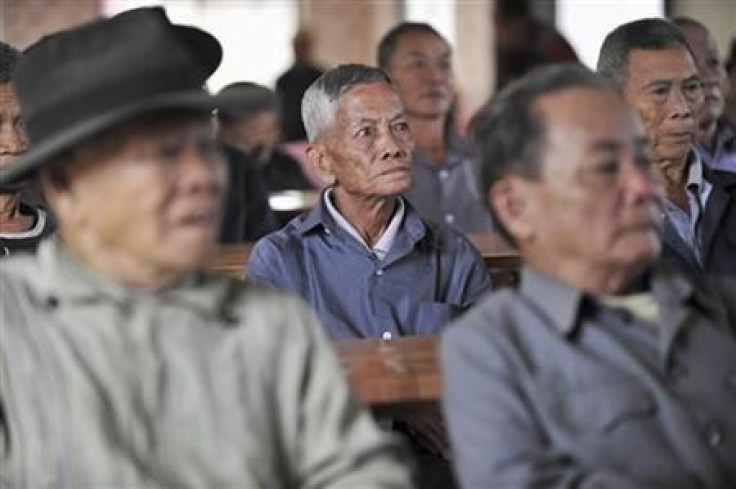China Enacts Law Requiring Adult Children To Visit Their Elderly Parents, But Can It Be Enforced?

The Chinese government is taking the ancient custom of filial piety -- that is, paying respects to one’s elders -- to a whole new level by enacting a law, effective on Monday, that will require citizens to frequently visit their elderly parents or keep in touch with them. The law, which was initially passed at the end of last year by China’s National People’s Congress, was part of several amendments to the Protection of the Rights and Interests of the Elderly legislation.
However, some details of the law remain vague; for example, the law only states that “family members who live apart from their parents should often visit or send regards to their parents.” Under Chinese law, ‘elderly parents’ are defined as those aged at least 60 and living on their own. According to Article 17 of the new law, family members are prohibited from “overlooking or neglecting the elderly,” but do not specify how much time is legally considered as “neglect” and instead defers to the discretion of the elderly. In addition, if elderly parents think their “spiritual needs” are being ignored by their children, they will be able to apply for mediation or bring their case to court.
“It is still unclear in the law how often people should visit,” Xu Zhenhua, a Shanghai-based lawyer told the Shanghai Daily newspaper. “Also, there is no clarification of the punishment for people who break this clause of the law.” The law also fails to specify what institutes fulfilling the needs of an elderly parent, but a clause has been added citing that “greeting” them represented a satisfactory form of catering to their “spiritual needs.” The clause was necessary since many adult children, especially those who are migrant workers, cannot afford to frequently visit their families. “It may be the result of taking consideration of the massive number of migrant workers who can’t afford frequent visits home, which may be thousands of miles away,” Xu explained.
According to a poll on Chinese online media company, Sina.com, 25.7 percent of the people surveyed did not believe the new law would have any kind of profound difference and doubted its practicality and enforceability. Many Chinese netizens have also taken to the popular social media platform, Weibo, to express their criticism of the new law. “It’s not feasible. The definitions are so vague, it will turn out to be a legal mess,” one blogger wrote. “The intention is there, but it doesn’t make sense. We can’t legally enforce the people’s moral obligation to their parents,” another added.
But others voiced disappointment and sadness that such a law even had to be put in place in order to pay respects to elderly parents. “Filial piety should be a natural thing. Why does the government have to use laws to force us to visit our parents? Maybe that’s the tragedy of our generation,” one user said. “What happened to our morals that it now needs to be enforced by law? Is this the only way some will follow through [with their parents]?” another added. According to a survey by China’s state-run television network, CCTV, 11.9 percent of people had not visited their parents in several years, while 33.4 percent of people surveyed saw them once a year.
Meanwhile, as in almost all advanced countries in the West and in Japan, China is facing a demographic crisis of aging -- suggesting the Beijing government will have to consider the health and welfare of an enormous number of elderly. According to the United Nations, in 2010 there were about 110 million people in China aged 65 or more. By 2030, the number is expected to jump by more than 100 million. Moreover, by the year 2050, more than one-fourth of the total population will be over 65.
Wang Feng, director of Brookings-Tsinghua Center for Public Policy in Beijing, warned in a recent report: "Profound demographic changes in China are redrawing the parameters of the country's future.”
© Copyright IBTimes 2024. All rights reserved.












